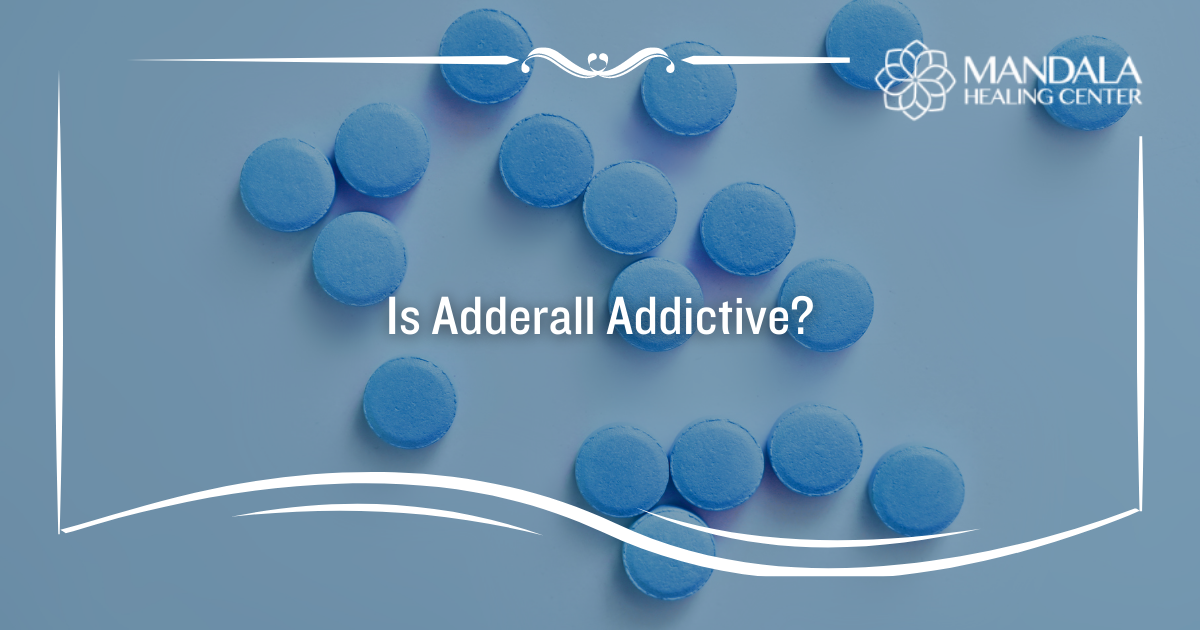Adderall is a prescription medication that contains dextroamphetamine and amphetamine salts. It is prescribed to control symptoms of attention deficit hyperactivity disorder (ADHD), such as difficulty focusing, controlling actions, and remaining still or quiet.[1]
While Adderall is highly effective in treating ADHD, the medication is also known to be habit-forming and addictive. With that being said, many people abuse the substance to experience a rush of euphoria and increased energy or focus. Of the 5 million adults who misused prescription stimulants, 56% reported doing so to experience cognitive enhancement.[2]
If you or a loved one frequently abuses Adderall to work harder or stay up later while studying, it is essential to note that this substance will cause more adverse effects than positive ones. Adderall is addictive when misused, putting you at extreme risk of developing long-term effects.
How Does Adderall Affect the Body?
Adderall contains four active ingredients: dextroamphetamine saccharate, amphetamine aspartate, dextroamphetamine sulfate, and amphetamine sulfate. These amphetamine salts stimulate the central nervous system in your brain, increasing the activity of norepinephrine and dopamine. Adderall is beneficial for people with ADHD, as they often lack dopamine and norepinephrine.
While Adderall helps people with ADHD experience improvements in hyperactivity, impulsivity, and inattention, people without this condition may experience effects similar to cocaine or even methamphetamine.
The possible short-term effects of Adderall include:[1]
- Dry mouth
- Restlessness
- Insomnia
- Appetite loss
- Nausea
- Constipation
- Diarrhea
- Blurred vision
- Sweating
- Tics
- Anxiety
- Change in libido
- Irritability
- Shortness of breath
- Numbness in extremities
- Heart palpitations
If you are taking Adderall as prescribed, you may experience the above-mentioned side effects for a short period until your body adjusts to the medication. People who abuse this substance may experience more severe side effects.
Is Adderall Addictive?
While people often believe that Adderall is a safe substance to abuse, it is highly addictive. Because it increases the levels of dopamine in the brain, your system will begin to associate Adderall with pleasure and reward. This causes you to experience severe cravings to abuse the substance, beginning the cycle of addiction.
Once you are addicted to Adderall, you will build a tolerance, meaning the dosage you were used to taking does not cause you to experience the desired effects anymore. As a result, you will begin to take higher doses of Adderall.
When you develop a tolerance to a substance, you are also developing physical dependence. Once physical dependence develops, you experience symptoms of withdrawal if you stop taking Adderall. While Adderall withdrawal symptoms are not known to be life-threatening, they can be extremely difficult to cope with.
If you or a loved one struggle with an Adderall addiction, you should always seek help from a reputable drug rehab program.
Signs of Adderall Addiction
Spotting an Adderall addiction can be tricky, especially because people often attempt to hide their substance abuse. If you are worried that your loved one has been abusing Adderall, being aware of the signs of addiction can help you determine whether they require treatment.
The common signs of Adderall addiction include:
- Being overly talkative
- Loss of appetite
- Significant weight loss
- Unusual excitability or irritability
- Aggression
- Secretive behavior
- Memory loss
- A decline in personal hygiene
- Relationship issues
- Having a hard time completing personal responsibilities
- Going to more than one doctor to receive multiple prescriptions (doctor shopping)
- Experiencing frequent urges to abuse Adderall
- Overworking
- Experiencing impulsivity or mania
- Paranoia
Another tell-tale sign of Adderall addiction is experiencing withdrawal symptoms. If your loved one displays any of the following symptoms when they don’t have Adderall, they may be addicted:[3]
- Anxiety
- Mood swings
- Fatigue
- Irritability
- Insomnia
- Changes in appetite
- Tremors
- Headache
- Poor concentration
- Lack of motivation
- Muscle aches
- Stomach pain
- Vomiting
- Cravings
- Depression
While these symptoms are not usually severe, they can be incredibly difficult to manage. Oftentimes, people who attempt to detox at home suffer from relapse to soothe their symptoms.
Find Help for Adderall Abuse and Addiction
If you or a loved one are addicted to Adderall, help is available. At Mandala Healing Center, we pride ourselves on offering highly individualized treatment plans that address every patient’s specific needs. This means that the treatment you receive will be relevant to the issues you are hoping to resolve.
With a combination of evidence-based behavioral therapy, group counseling, peer support, and relapse prevention planning, you can learn how to live a fulfilling and substance-free life. From medical detox to residential rehab, we have a full continuum of care for you or your loved one to take advantage of.
To learn more about our Adderall abuse and addiction treatment programs, contact Mandala Healing Center today. Mandala’s Admissions Coordinators are available 24 hours a day. All calls and forms are 100% free and confidential.
References:
- https://medlineplus.gov/druginfo/meds/a601234.html
- https://nida.nih.gov/news-events/news-releases/2018/04/five-million-american-adults-misusing-prescription-stimulants
- https://www.ncbi.nlm.nih.gov/pmc/articles/PMC7138250/












